

American Buddhism on the rise. CAMBRIDGE, MASS. — That genial face has become familiar across the globe – almost as recognizable when it comes to religious leaders, perhaps, as Pope John Paul II.
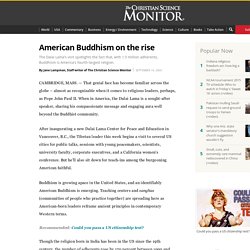
When in America, the Dalai Lama is a sought-after speaker, sharing his compassionate message and engaging aura well beyond the Buddhist community. After inaugurating a new Dalai Lama Center for Peace and Education in Vancouver, B.C., the Tibetan leader this week begins a visit to several US cities for public talks, sessions with young peacemakers, scientists, university faculty, corporate executives, and a California women's conference. But he'll also sit down for teach-ins among the burgeoning American faithful. Buddhism is growing apace in the United States, and an identifiably American Buddhism is emerging. Teaching centers and sanghas (communities of people who practice together) are spreading here as American-born leaders reframe ancient principles in contemporary Western terms.
Reincarnation - Buddhism and Reincarnation or Rebirth. Would you be surprised if I told you that reincarnation is not a Buddhist teaching?
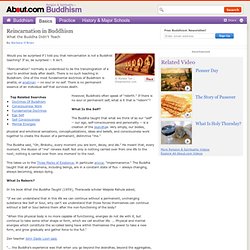
If so, be surprised -- it isn't. "Reincarnation" normally is understood to be the transmigration of a soul to another body after death. There is no such teaching in Buddhism. The Position of Women in Buddhism. Today, when the role of Women in Society is an issue of worldwide interest it is opportune that we should pause to look at it from a Buddhist perspective.
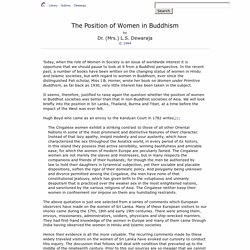
In the recent past, a number of books have been written on the changing status of women in Hindu and Islamic societies, but with regard to women in Buddhism, ever since the distinguished Pali scholar, Miss I.B. Horner, wrote her book on Women under Primitive Buddhism, as far back as 1930, very little interest has been taken in the subject. It seems, therefore, justified to raise again the question whether the position of women in Buddhist societies was better than that in non-Buddhist societies of Asia. We will look briefly into the position in Sri Lanka, Thailand, Burma and Tibet, at a time before the impact of the West was ever felt. Hugh Boyd who came as an envoy to the Kandyan Court in 1782 writes,[1] Zen Buddhism. The essential element of Zen Buddhism is found in its name, for Zen means "meditation.
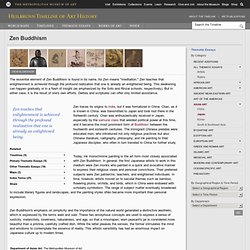
" Zen teaches that enlightenment is achieved through the profound realization that one is already an enlightened being. This awakening can happen gradually or in a flash of insight (as emphasized by the Soto and Rinzai schools, respectively). But in either case, it is the result of one's own efforts. Deities and scriptures can offer only limited assistance. Zen traces its origins to India, but it was formalized in China. Today, ink monochrome painting is the art form most closely associated with Zen Buddhism. The Noble Eightfold Path: The Way to the End of Suffering. The essence of the Buddha's teaching can be summed up in two principles: the Four Noble Truths and the Noble Eightfold Path.
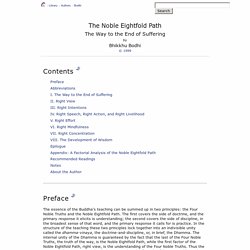
What do Buddhists believe - Beliefs of Buddhism. By Barbara O'Brien Updated April 30, 2015.

Shortly after I began to study Buddhism, someone asked me "What do Buddhists believe? " I was taken aback by the question. What do Buddhists believe? No one had told me I had to believe any particular thing. Guiding Means. Nirvana Definition in Buddhism (What Is It?) Definition: Most schools of Buddhism explain Nirvana as a state of bliss or peace, and this state may be experienced in life, or it may be entered into at death.

The word Nirvana means "to extinguish," such as extinguishing the flame of a candle. This "extinguishment" is not understood by Buddhists to mean annihilation, however. What is Theravada Buddhism? Theravada (pronounced — more or less — "terra-VAH-dah"), the "Doctrine of the Elders," is the school of Buddhism that draws its scriptural inspiration from the Tipitaka, or Pali canon, which scholars generally agree contains the earliest surviving record of the Buddha's teachings.[1] For many centuries, Theravada has been the predominant religion of continental Southeast Asia (Thailand, Myanmar/Burma, Cambodia, and Laos) and Sri Lanka.
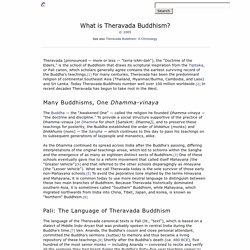
Today Theravada Buddhists number well over 100 million worldwide.[2] In recent decades Theravada has begun to take root in the West. Many Buddhisms, One Dhamma-vinaya The Buddha — the "Awakened One" — called the religion he founded Dhamma-vinaya — "the doctrine and discipline. " Pali: The Language of Theravada Buddhism The language of the Theravada canonical texts is Pali (lit., "text"), which is based on a dialect of Middle Indo-Aryan that was probably spoken in central India during the Buddha's time.[7] Ven. Britannica School. Buddhism Basic Beliefs and Teachings. By Barbara O'Brien Updated December 29, 2015.
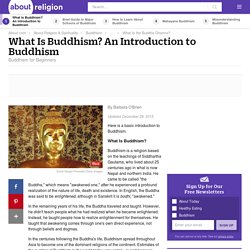
Here is a basic introduction to Buddhism. What Is Buddhism? Buddhism is a religion based on the teachings of Siddhartha Gautama, who lived about 25 centuries ago in what is now Nepal and northern India. He came to be called "the Buddha," which means "awakened one," after he experienced a profound realization of the nature of life, death and existence. Biography of Siddhartha Gautama, the Founder of Buddhism. Siddhartha Gautama's Early Life Siddhartha Gautama was born about 583 BCE, in or near what is now Nepal.

His father, King Suddhodana, was leader of a large clan called the Shakya. His mother, Queen Maya, died shortly after his birth. When Prince Siddhartha was a few days old, a holy man prophesied the Prince would be either a great military conqueror or a great spiritual teacher. King Suddhodana preferred the first outcome and prepared his son accordingly. The Four Passing Sights One day, overcome with curiosity, Prince Siddhartha asked a charioteer to take him on a series of rides through the countryside. Finally, he saw a wandering ascetic. The religion of Buddhism. Religions of the world Menu Quotation by Siddhãrtha Gautama (Buddha): "Do not believe in anything simply because you have heard it. Do not believe in anything simply because it is spoken and rumored by many. Do not believe in anything simply because it is found written in your religious books. Sponsored link Background: Buddhism currently has about 376 million followers and is generally listed as the world's fourth largest religion after Christianity, Islam and Hinduism.
Topics covered in this section: Sponsored link: Amazon.com's online store lists the following books on Buddhism: If you see a generic Amazon.com ad here, please click on your browser's refresh key. For an introduction to Buddhism, we recommend the following books. Thubten Chodron, "Buddhism for Beginners. " Not a sponsored link Site navigation: Copyright © 1996 to 2011 by Ontario Consultants on Religious Tolerance Latest update: 2013-JUL-08 Author: B.A. Sponsored link. Basics of Buddhism. The Four Noble Truths The Four Noble Truths comprise the essence of Buddha's teachings, though they leave much left unexplained. They are the truth of suffering, the truth of the cause of suffering, the truth of the end of suffering, and the truth of the path that leads to the end of suffering.
More simply put, suffering exists; it has a cause; it has an end; and it has a cause to bring about its end. Sacred Texts: Buddhism. Sacred-texts home Journal Articles: Buddhism OCRT: Buddhism Buy CD-ROM Buy Books about Buddhism Modern works Southern Buddhism Northern Buddhism JatakaLinks Modern works The Gospel of Buddha: Compiled from Ancient Records by Paul Carus [1909]A modern retelling of the Buddha's work and life. ARC - Faiths and ecology - What does Buddhism teach about ecology? All beings are connected Buddhism teaches that the idea of separateness is an illusion.
The health of the whole is inseparably linked to the health of the parts, and the health of the parts is inseparably linked to the health of the whole. This means that caring for the environment begins with caring for oneself: ‘When our hearts are good, the sky will be good to us,’ says Venerable Maha Ghosananda of Cambodia, a founding patron of ARC. Respect for life Buddhist practice makes one feel one’s existence is no more important than anyone else’s.
Simplicity and moderation Buddha taught people to live simply and appreciate the natural cycle of life. Buddhists in Japan tell a story. Right livelihood. Buddhism Origins, Buddhism History, Buddhism Beliefs.